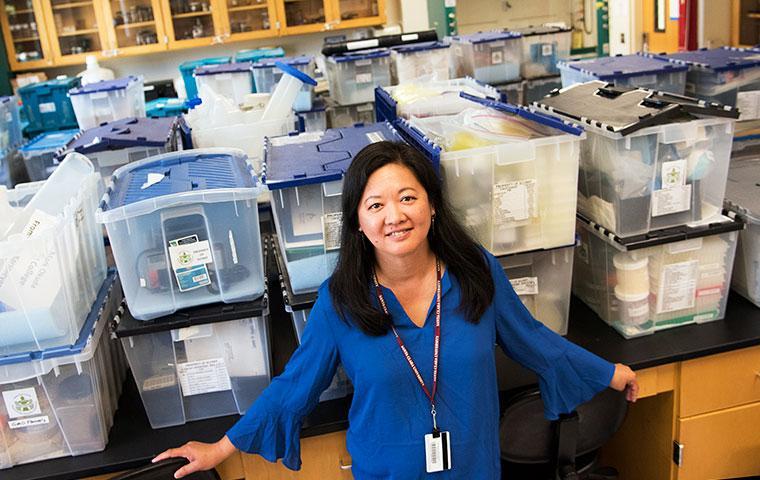
Opportunity in a Box
Tina Vossugh
Katy Korsmeyer leads an effort to give Bay Area high school science teachers the supplies they need.
Before local high schools started back up, Katy Korsmeyer’s team of interns were hard at work making sure science teachers had the supplies they needed for the year—pipettes, DNA kits, meters, strips, even an ice crusher.
“We’ve had teachers who said they need crushed ice for using temperature-sensitive DNA and keeping it stable. They’d go buy ice and crush it with a hammer,” says Korsmeyer, Associate Director of Special Projects for the Dean of the College of Arts & Sciences. “That’s dedication but not something a teacher needs to worry about in the middle of a lesson. So we added an ice crushing machine to the kits.”
The project is an initiative by Teach Biotech, a nonprofit created by the Santa Clara County Biotechnology Education Partnership (SCCBEP). The interns, who are local high school students working with the Silicon Valley STEM Internship Program, join Korsmeyer to pack the mobile science kits to the specifications of Bay Area teachers.
Korsmeyer, a biochemist, is at the heart of the operation and runs the program with support from SCU’s Biology Department. She’s been doing biotech education outreach for two decades through Teach Biotech.
“Not all schools have the right prep rooms, or remodeled science buildings to conduct real labs using DNA and biochemicals that need special handling, storage, and disposal,” says Korsmeyer. “So, this system and our kits were created to distribute equal access to everyone.”
Teachers pick up their kits in August and transfer boxes to each other. When one teacher’s done, the next picks it up. The kits can range between one box of supplies to up to 100-plus boxes, depending on the type of kit. Classroom sets can include items like micropipettes, gel boxes, power supplies, blood glucose meters, fingerprint magnetic dusters, and even a disarticulated skeleton for forensics.
Equipment is obtained through grants and donations. For example, LifeScan, a Johnson & Johnson company, donates all the meters, strips, reagents, and resources for a diabetes technology kit. Depending on the contents, the kits are valued from $3000 (small set of boxes) to upwards of $30,000 (the largest kit of a dozen plus boxes). Teach Biotech charges schools just $100. For the 2016-17 school year, the project served 353 class sections.
Korsmeyer has never worked an industry job in biotechnology. Her passion lies in teaching. She glows as she speaks about her work. “Kids need to be exposed to biotechnology because it affects everyone’s lives now."
She says education is the key to empower the next generation to make the right ethical decisions on issues surrounding biotechnology.
“Our kids are eventually going to vote on health-related issues that’ll affect many generations of people,” Korsmeyer says. “When I’m old and needing certain drugs or whether there’s a question of wanting to be kept alive with life-extending techniques, I don’t want to leave those decisions to an uneducated group to decide what’ll happen to me.”
Korsmeyer started at Santa Clara as an adjunct faculty member but recently took on the role of Associate Director of Special Projects. In her new role, she is facilitating faculty grant management, establishing internships for undergraduates, expanding mentoring programs, and supporting the college with new projects and programs which may include further outreach.
“I’ve been meeting fabulous professors from all over the college,” Korsmeyer says. “There is so much great stuff happening. The things we’re doing for the local community, the schools, it’s amazing.”